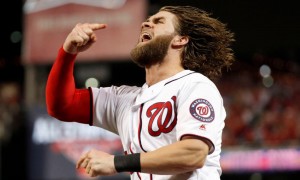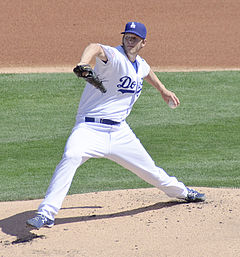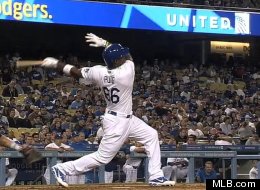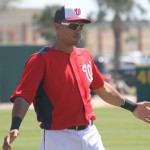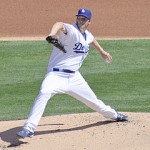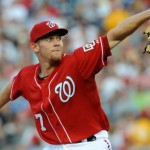
What's eating Gilbert Grape? Photo: howtowatchsports.com
Our Ace, and “Best in the League” by many pundits pitcher Stephen Strasburg is now 1-4 on the season with relatively pedestrian (for him) numbers so far (3.16 ERA, 3.32 FIP, 3.65 xFIP).
So what’s the problem? Or, more importantly, what is NOT the problem?
First off; I think its safe to say we can ignore his inflated FIP and xFIP numbers for now. As I pointed out in this April 4th post about my issues with fWAR, FIP focuses entirely on the “Three true outcomes” that a pitcher entirely controls and really does a poor job of measuring pitchers who induce a whole slew of weak ground balls (like Strasburg does). This is easily seen by looking at the two example cases in the 4/4/13 post to see how FIP measures a guy who strikes out 9 but gives up 5 earned runs higher than a guy who strikes out just a few but gives up zero runs in an outing.
I also do not buy the opinions I’ve heard in various forums and podcasts that hitters are “squaring him up” a lot this year. You heard this a lot after his 4/19/13 loss to the Mets, when he gave up back-to-back homers to Ike Davis and Lucas Duda in the 6th (two of the three homer’s he’s given up this year, the third being an out-of-this-world chest-high fastball just clubbed out by Evan Gattis). I don’t buy this because observation has shown that he gives up a TON of bloops, dinks, infield nubbers, etc. He also has a very low Line-Drive percentage right now; just 14.9% of the balls hit off of him so far this year have been classified as “line drives,” or hard-struck balls.
Dave Cameron of Fangraphs had a piece on ESPN talking about Strasburg and the Nats “pitch to contact” strategy that shows essentially that pitch-to-contact guys don’t really throw that fewer a number of pitches than guys who just try to strike you out. Is Strasburg’s change in style leading to issues for him? So far it doesn’t seem so: he’s averaging about 6 1/3 innings per start and has been right around 110 pitches each of his last four despite still going deeper into the game. But his K/9 is absolutely down (from 11.1 last year to 8.0 this year).
No, I think Strasburg’s issues are these three items.
1. Bad first innings. Tom Boswell had a great piece on this earlier this week, talking about how a lack of a first pitch strike has really cost Strasburg this year. And he’s right; pretty much the absolute worst thing you can do as a pitcher is to show a hitter your fastball for a ball at 0-0. Not only does the hitter get the timing down pretty well on your fastball, but he also gets ahead in the count. Boswell is probably right in saying that hitters are now trying to jump on the first fastball they get, knowing that getting behind in the count against him is near-certain demise; but Strasburg has to make that adjustment too. He can’t nibble on first pitch fastballs; he has to be smarter than that.
Strasburg has given up 15 total runs in 5 games this year; fully EIGHT of them have come in the first inning. That just cannot continue.
2. Bad luck; we’ve watched his games, and he’s not exactly getting pounded when he gives up most of these runs. Check out the game-logs for his losses:
- April 7th; 6 runs given up to Cincinnati: in the first he gave up his runs after two infield singles and a walk turned into a 2-rbi double, the only well-hit ball of the inning. He gave up 3 more in the 6th on some better hit balls and had one runner score after he departed.
- April 13th: 6 innings pitched, zero earned runs and a loss; Ryan Zimmerman threw away a routine 3rd out and the next guy up clubbed a homer. Yes, he gave up a homer (it wasn’t as if he made a bad pitch there; Gattis just crushed it) but he never should have been in the position in the first place.
- April 19th: Two more unearned runs in the first when Desmond booted the first ball of the day; a weak dribbler up the middle. He gave up two more hits in the 1st but only Buck‘s was really a line-drive. By the 6th inning he gave up two bombed homers; no bad luck there.
- April 24th: the lead-off double was earned, but the rest of the hits in the first were opposite field shorter line drives, with the required Nationals infield error thrown in to ensure unearned runs contributing to his day.
Only four of his 15 runs allowed were deemed to be unearned, but we’ve watched the games. Zimmerman’s error against the Braves decided that game. Desmond’s error against the Mets set the tone. The team went down 3-0 in the first against both Cincy and St. Louis at a time when the offense was struggling. Just can’t do that. Speaking of the offense…
3. Lack of Run Support. In his five starts, Strasburg’s offense has scored this many runs for him: 2,3,1,1, and 2. That’s 1.8 runs per game! Maybe Bob Gibson in 1968 could have gotten wins with that little run support, but certainly not Strasburg. The Nats YESTERDAY gave Gio Gonzalez nearly the same total run support that Strasburg has gotten all year.
